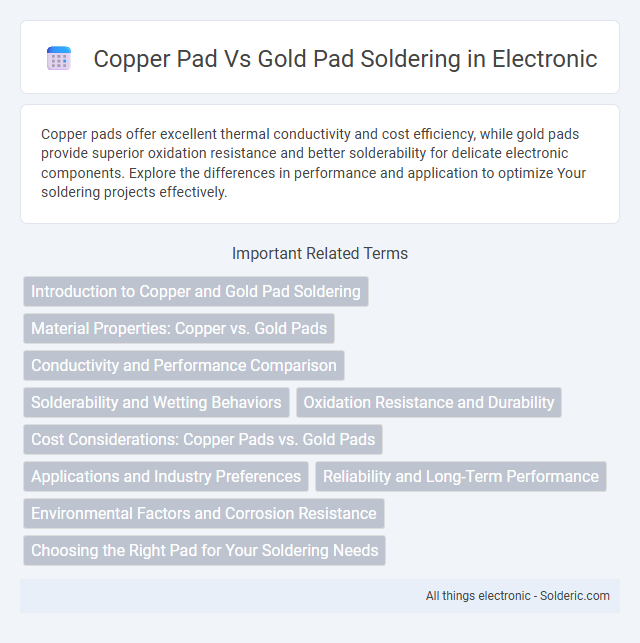Copper pads offer excellent thermal conductivity and cost efficiency, while gold pads provide superior oxidation resistance and better solderability for delicate electronic components. Explore the differences in performance and application to optimize Your soldering projects effectively.
Comparison Table
| Aspect | Copper Pad | Gold Pad |
|---|---|---|
| Material Composition | Pure Copper | Gold-plated Copper |
| Corrosion Resistance | Prone to oxidation | Highly resistant to oxidation |
| Solderability | Good after proper cleaning | Excellent, requires less cleaning |
| Durability | Moderate, may degrade over time | High, maintains surface quality longer |
| Cost | Low | High |
| Typical Applications | Standard PCBs, cost-sensitive projects | High-reliability electronics, gold-wired components |
| Heat Tolerance During Soldering | Moderate | High |
Introduction to Copper and Gold Pad Soldering
Copper pad soldering provides excellent thermal conductivity and cost-effectiveness, making it widely used in printed circuit board (PCB) assembly. Gold pad soldering offers superior corrosion resistance and reliable electrical contact, especially in high-frequency or high-reliability applications. Selecting between copper and gold pads depends on factors like environmental exposure, electrical performance requirements, and budget constraints.
Material Properties: Copper vs. Gold Pads
Copper pads exhibit excellent thermal and electrical conductivity but are prone to oxidation, forming a surface layer that can negatively impact solder joint reliability and require protective coatings or surface treatments. Gold pads provide superior oxidation resistance and maintain consistent solderability over time due to gold's inert properties, which help prevent issues related to surface contamination and improve long-term joint integrity. The choice between copper and gold pads depends on factors such as environmental exposure, cost constraints, and the desired durability of the solder connection in electronic assemblies.
Conductivity and Performance Comparison
Copper pads exhibit excellent electrical conductivity, making them highly efficient for soldering connections in electronic circuits, while gold pads offer superior corrosion resistance and maintain consistent conductivity over time. Gold's inert properties prevent oxidation, ensuring reliable long-term performance, whereas copper pads may require protective coatings to avoid degradation in harsh environments. The choice between copper and gold pads depends on the balance between initial conductivity and durability in the intended application.
Solderability and Wetting Behaviors
Copper pads offer excellent solderability due to their active surface, promoting strong wetting behavior, but they are prone to oxidation, which can hinder solder joint quality if not properly protected. Gold pads maintain superior solderability and consistent wetting because gold resists oxidation and forms reliable intermetallic bonds with solder alloys. For the best soldering performance of your PCB, gold pads provide more consistent wetting characteristics, especially in high-reliability applications or environments prone to corrosion.
Oxidation Resistance and Durability
Gold pads offer superior oxidation resistance compared to copper pads, which tend to oxidize quickly and degrade solderability over time. The durability of gold pads ensures more reliable long-term solder joints, making them ideal for high-performance or harsh environment applications. When you need consistent quality and longevity in your solder connections, gold pads provide a significant advantage.
Cost Considerations: Copper Pads vs. Gold Pads
Copper pads are significantly more cost-effective than gold pads due to copper's lower raw material and processing expenses, making them ideal for budget-sensitive electronics manufacturing. Gold pads, while offering superior corrosion resistance and enhanced solderability, incur higher costs that may not justify their use in standard or high-volume production. Your choice should balance performance requirements with budget constraints, ensuring cost efficiency without compromising solder joint reliability.
Applications and Industry Preferences
Copper pads are widely favored in electronics manufacturing for their excellent thermal conductivity and cost-effectiveness, making them ideal for mass production of printed circuit boards (PCBs) in consumer electronics and automotive industries. Gold pads, though more expensive, offer superior corrosion resistance and reliable solder joints, leading to their preference in high-reliability applications such as aerospace, medical devices, and high-frequency communication equipment. Your choice between copper and gold pads depends on the specific operational demands and environmental conditions of the end product.
Reliability and Long-Term Performance
Copper pads offer strong mechanical adhesion and excellent electrical conductivity but are prone to oxidation, which can degrade solder joint reliability over time. Gold pads provide superior corrosion resistance and maintain consistent solderability, ensuring enhanced long-term performance and reliability in harsh environments. The use of gold plating minimizes the risk of intermetallic compound formation, resulting in stable solder joints crucial for high-reliability applications.
Environmental Factors and Corrosion Resistance
Copper pads offer excellent thermal conductivity but are more prone to oxidation and corrosion when exposed to moisture and environmental contaminants, which can compromise solder joint reliability over time. Gold pads provide superior corrosion resistance due to their inert nature, maintaining solder integrity even in harsh environments and enhancing long-term durability. Your choice between copper and gold pads should consider the operating environment's exposure to humidity and corrosive agents to ensure optimal performance.
Choosing the Right Pad for Your Soldering Needs
Choosing the right pad for your soldering needs depends on factors like conductivity, durability, and corrosion resistance. Gold pads offer excellent corrosion resistance and superior solderability, making them ideal for high-reliability applications, while copper pads provide good conductivity but require proper surface treatment to prevent oxidation. Ensure your soldering process accounts for the pad material to achieve optimal joint strength and long-term performance.
copper pad vs gold pad soldering Infographic

 solderic.com
solderic.com